-
Derbyshire community energy group shortlisted for national industry award
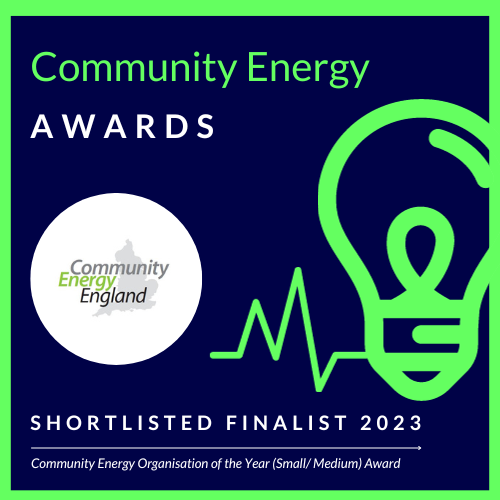
An organisation spearheading Derbyshire’s grassroots shift to renewable energy has been shortlisted for a national award just as final preparations begin for installing its first solar arrays in the Matlock area.
By Ed Dingwall, Derbyshire Times
Published 7th Nov 2023, 12:00 GMT
Derbyshire Dales Community Energy Ltd (DDCE) is in contention to win small/medium organisation of the year at Community Energy England’s awards ceremony in Manchester on Friday, November 17.
The recognition follows work to support 16 other community groups across rural Derbyshire looking to develop their own energy infrastructure projects.
Matlock resident Steve Martin, who chairs the community benefit society, said: “We’re very pleased to be nominated. It endorses, in a national sense, all the work we’re doing to decarbonise as much as we can in the Dales and across Derbyshire. It’s a huge issue and the evidence all around us is that climate change is even more devastating than anyone once believed. The work we’ve been doing over the last few years feels very prescient.”
The two sites closest to going live are Tansley food wholesaler John Palin Ltd and Matlock construction supplier William Twigg, where rooftop solar panels are expected go up in early 2024.
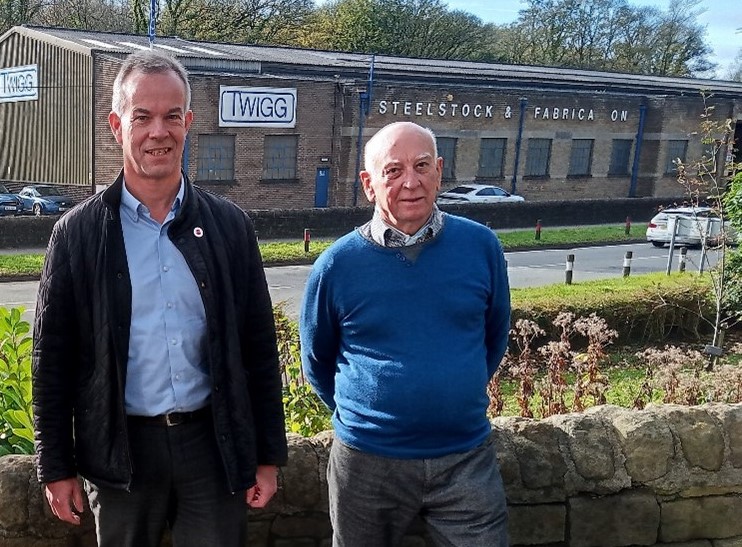
Richard Tarbatt of William Twigg Ltd, left, and Professor Steve Martin of DDCE. Richard Tarbatt, managing director of Twiggs, said: “We were delighted to support the nomination of Derbyshire Dales Community Energy for the award. “They deserve this because of their unstinting efforts in getting eight sites to a commercial offer which will be the very first community led installation of solar panels in the County. The board of directors deserve this recognition for their commitment and professionalism throughout their partnership with us.”
Derbyshire Dales Community Energy has earned national recognition for its work to bring small-scale renewable energy to rural areas.
While DDCE started out with plans to own and operate its own energy plants, its mission has shifted with market conditions to become a hub of expertise for other partners to draw on, partly funded by £50,000 grant from Derbyshire County Council.
Its pipeline of projects includes establishing a new community benefit society and electric vehicle charging points in Belper, two hydroelectric schemes in Cromford, and solar schemes in Hope Valley, Buxton and Bonsall and an ambitious heat network programme in Brassington, a village not connected to the main gas grid.
Stimulating community energy activities across the county is intended to help realise local authorities’ net zero carbon targets, but DDCE is making an impact across the whole East Midlands by working with councils in Nottinghamshire and other regional decision-makers.
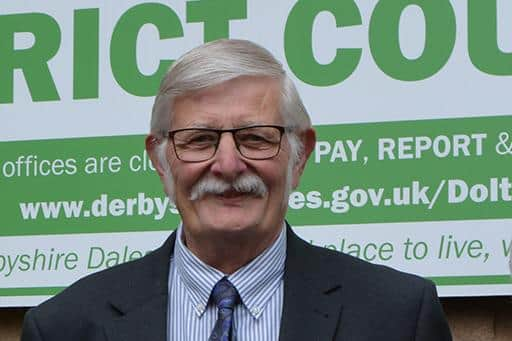
Councillor Steve Flitter, leader of Derbyshire Dales District Council has commended DDCE’s work. He added: “Climate change is a priority for the council, and we are making positive steps towards our goal of being net zero by 2030.We enthusiastically support the work of DDCE in their efforts to collaborate with key local businesses to reduce district wide emissions through the generation of clean energy. The council has supported the work of the group since its inception, and it is great to see their progress rewarded through nomination for this award.”
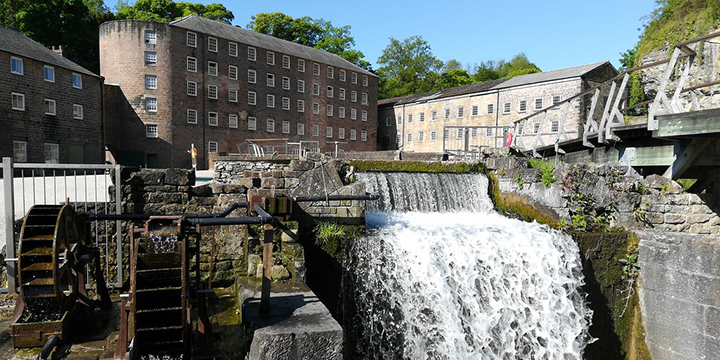
Work is well under way to bring a new era of hydroelectric power to Cromford and its historic mills. Its infrastructure ambitions may be relatively modest compared with the task of decarbonising national and global energy systems, but DDCE also acts as a catalyst for community engagement and empowerment, allowing people to take collective action on the climate crisis that goes beyond personal lifestyle and consumer choices. Steve Martin said: “It’s having a big impact on people’s feelings of security, now and in the long-term for their children and grandchildren. Eco-anxiety is becoming a word in many people’s vocabulary.” The organisation was born out of residents’ realisation that communities along the Derwent Valley are facing increased exposure to interconnected sustainability challenges – from escalating flood risks to the management of tourism as a cornerstone of the local economy.
DDCE aims to build resilience amid those challenges through new ways of participatory working – involving communities in identifying the threats and opportunities in their physical, social and cultural context.
Drawing initially on the skills and knowledge of Dales residents, its board of directors includes sustainability consultants, engineering and project management professionals, experienced business leaders, and a small team of recent graduates equipped with all the latest thinking on environmental leadership.
With the support of the UK National Commission for UNESCO and the University of Nottingham, DDCE is now developing a programme of in-depth research to understand the impact climate change, the energy crisis and related factors are having on community energy groups in Derby, Cromford, Belper, and Darley Bridge.
Though its work may be becoming more relevant with each passing climate milestone, there are questions over what happens once the county council grant runs out.
Steve Martin said: “We have a little bit left and we’re going to be running some village workshops in Brassington, Hope Valley and a few other places with the charity Change Agents UK. I’m always optimistic that there will be more money forthcoming. I’m hopeful we’ll see some energy behind that soon.”
DDCE teamed up with the Shropshire-based Big Solar Co-op last year to raise investment in its first wave of sites, and Big Solar is currently running another share offer for the next phase of its plans.
While the available shares are in the national co-operative, DDCE has gained pledges from Big Solar to use local contractors and to develop sites for local community benefit like that of Hurst Farm Social Club and its food bank in Matlock.
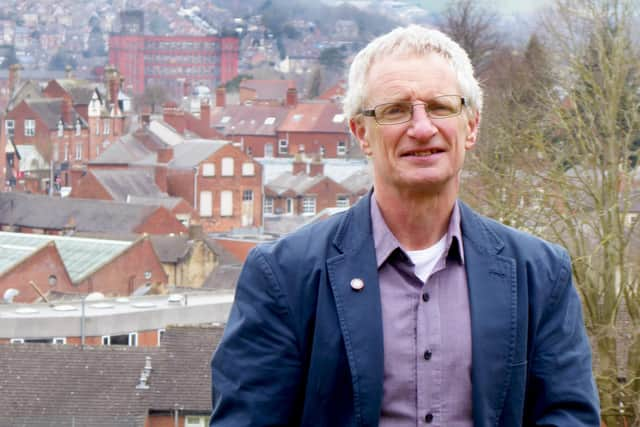
Derbyshire’s first Green county councillor Gez Kinsella has received support to develop solar plans for Belper Community Energy.
It is also looking at other socially important sites that might not be viable in isolation such as small medical practices.
Gez Kinsella, a Green Party county councillor and chair of Belper Community Energy, said: “DDCE has been a local trailblazer in developing community owned, renewable energy projects. Working with Big Solar, DDCE has developed a pragmatic approach to promoting local renewable energy solutions. DDCE bring excellent local knowledge and expertise in negotiating installations with commercial and community organisations. Furthermore, DDCE has established a replicable model, so this will no doubt be the first of many local renewable energy installations.”
For more details on DDCE’s projects and impact, see derbyshiredalesenergy.org.uk.
For information on the Big Solar share offer, go to bigsolar.coop/invest/.
-
Community Energy Fund – latest news
Negotiations with MP supporters of the Local Electricity Bill amendments, deleted by government from the Energy Bill, have resulted in the government creating the Community Energy Fund of £10m over 2 years to help identify and develop projects in England. Once admin and running costs are deducted the fund will be £9m. At the conference last week, Olivia Blunn, Head of Local Energy Policy and Finance, gave some key updates, supported by staff from 3 of the Net Zero Hubs. The fund will open soon, probably mid-October, so watch out for emails and social media announcements and start getting your fundable projects together. It will provide grant funding of £40,000 per project for feasibility work to test ideas and grants of up to £130,000 for developing the project up to investment readiness. Crucially, unlike the late RCEF, community organisation will be able to undertake the feasibility studies themselves, at market rate, rather than having to bring in consultants. This enables the organisation to build and retain capacity and skills – though there is still the challenge of the first stage of acquiring the necessary skills, which Community Energy England(CEE) is looking at how we can support. CEE is planning to organise a webinar with the Hubs in October – details to be announced soon.
The Tory government has promised an annual report to parliament on progress on community energy and to consult on the barriers to community energy delivering projects. Meanwhile the Labour party are ramping up their support for community energy. Their Local Energy plan is ambitiously predicting that they can scale up our abysmally low level of generation capacity from community energy to 8 Giga Watts of capacity!
Watch Ed Miliband speak about it at the Cooperative Party Conference a few week ago: https://www.youtube.com/watch?v=3ULte0yxFTI&t=5294s He argues that there is a massive appetite for community energy -people asking -what can I do? Community energy is a compelling way to address this repetitive and anxious question. It offers everyone a part to play in this energy revolution. -
Midlands Net Zero Hub
Community Energy projects are bringing benefits to groups across Derbyshire. By increasing the uptake of locally owned renewable energy these initiatives support Local Government and National Government targets for reaching net zero.
This video describes the work of DDCE Ltd and features one of its founding members, Emma Hickling.